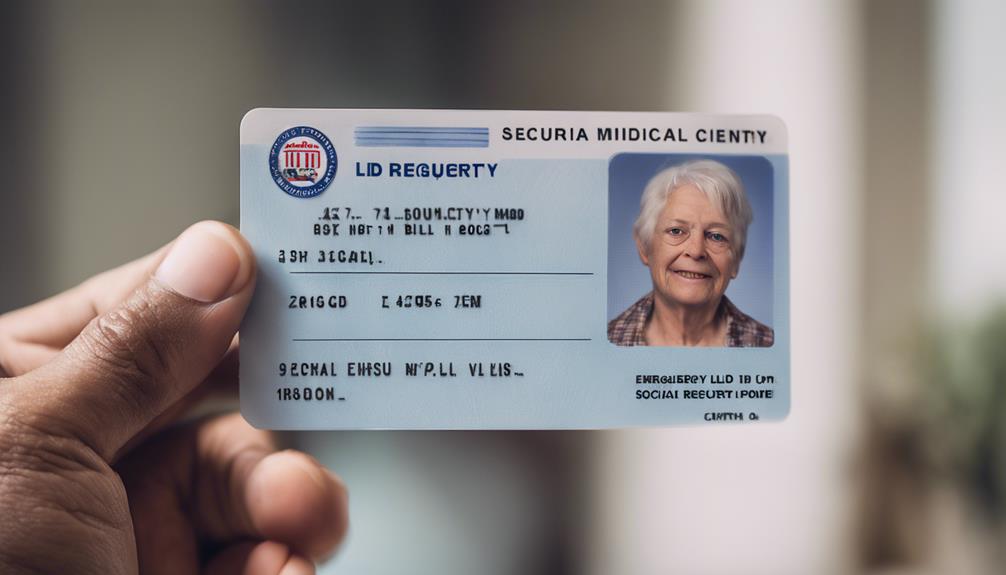To get Illinois Emergency Medicaid, you'll need to show documents like pay stubs for income, utility bills for residency, and ID like a driver's license. These prove your eligibility and support for specific state criteria. The process involves verifying your financial situation, where you live, who you are, and why you need emergency healthcare. Ensure these documents are recent, clear, and relevant to improve your chances of approval. Completing the application accurately with the required documents is crucial.
Eligibility Requirements
To qualify for Illinois Emergency Medicaid, you must meet specific eligibility criteria established by the state. The application process involves submitting various documents to verify your eligibility. These documents typically include proof of identity, residency in Illinois, and immigration status if applicable. Additionally, you'll need to provide documentation regarding your income and household size for income verification purposes.
The eligibility criteria often require applicants to have a limited income and resources. The state sets specific income thresholds that applicants must fall below to qualify for the program. It's essential to provide accurate and up-to-date information during the application process to ensure your eligibility is properly assessed.
When submitting your documentation, ensure that all information is complete and accurate. Incomplete or incorrect information could delay the processing of your application or result in a denial of benefits.
Proof of Income
When applying for Illinois Emergency Medicaid, one crucial aspect to address is providing sufficient proof of your income. Income verification is a key requirement to determine your eligibility for this program. To verify your income, you'll typically need to provide financial statements such as pay stubs, tax returns, or bank statements. These documents help the Medicaid office assess your financial situation accurately.
When submitting your financial statements, ensure they're recent and accurately reflect your current income status. If you're employed, pay stubs from the past few months can serve as proof of your regular income. For self-employed individuals, tax returns from the previous year can help demonstrate your average earnings.
Residency Verification
Verifying your residency is a critical step in the Illinois Emergency Medicaid application process. To prove your address, you typically need to provide documents like utility bills. These bills should be recent and in your name, serving as official proof of your current residence within the state of Illinois. Utility bills are commonly accepted as they're reliable indicators of where you live.
When submitting utility bills for residency verification, ensure they're no older than a few months to demonstrate your current living situation accurately. The address on the utility bills must match the address you have listed on your Medicaid application.
In some cases, additional documents such as a lease agreement or a mortgage statement may be requested to further confirm your residency.
Identification Documents
Submitting valid identification documents is crucial during the Illinois Emergency Medicaid application process. When applying for Illinois Emergency Medicaid, you'll need to provide supporting documents to verify your identity.
Acceptable identification documents typically include a state-issued driver's license, a state identification card, a passport, or a birth certificate. These documents are essential for confirming your identity and ensuring that you meet the eligibility requirements for emergency Medicaid assistance.
During the application process, be prepared to submit clear photocopies of your identification documents. Make sure that the copies are legible and include all relevant information, such as your name, date of birth, and photograph. Providing accurate and up-to-date identification documents will help streamline the application process and prevent any delays in receiving emergency Medicaid benefits.
Remember that the submission of valid identification documents is a crucial step in the Illinois Emergency Medicaid application process. By ensuring that you have the necessary supporting documents, you can expedite the approval of your emergency Medicaid coverage.
Medical Necessity Documentation
To support your Illinois Emergency Medicaid application, ensure you provide necessary medical necessity documentation to validate the need for emergency healthcare services. Emergency Medicaid is designed to cover emergency medical services for individuals who don't qualify for regular Medicaid due to immigration status or other factors.
When applying for Emergency Medicaid, it's crucial to submit detailed medical records that demonstrate the urgency and necessity of the medical care needed. Medical records play a vital role in determining Medicaid coverage for emergency services. These records should include documentation from healthcare providers certifying the medical necessity of the services being requested.
Physicians play a critical role in this process by providing their professional assessment and certification of the emergency medical care needed. Without proper medical necessity documentation, your Emergency Medicaid application may be delayed or denied.
Ensure that your medical records clearly outline the emergency medical situation, the recommended treatment, and the physician's certification of the necessity of the care to improve your chances of receiving Emergency Medicaid coverage.
Conclusion
In conclusion, ensuring you have all necessary documents for Illinois Emergency Medicaid is crucial for eligibility.
One interesting statistic to note is that over 2 million Illinois residents are enrolled in Medicaid, highlighting the importance of this program in providing healthcare coverage for those in need.
By having the required paperwork in order, you can expedite the application process and access the support you require in times of emergency.
